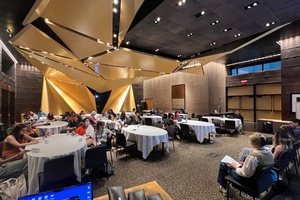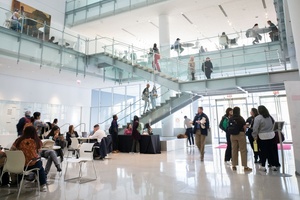Features:
The GEN Newsgaming Hackathon
The Chicago Tribune team reports back

The Game Center, our winning entry
Last weekend, ten teams participated in a competition to develop newsgames at Editors’ Lab New York, a hackathon organized by the Global Editors Network and The New York Times.
Combining the fantastical and playful aspects of gaming with hard news is a hard problem and there are few examples of well-conceived and executed newsgames. Thanks to the hack day, there are now a few more.
- Heart Saver by ProPublica dramatizes inequities in access to hospital care by challenging players to route heart attack victims to the nearest or best hospital.
- The Waffler by Digital First Media uses real polling data in a high-speed game where you play a politician who must answer a barrage of questions about your positions during a campaign.
- Inskeep’s Quest saw NPR digging into their archives for a “guess that year” listening game, starring Steve Inskeep, host of morning edition, complete with a tote bag you can buy.
- Pic Squared by the Texas Tribune is a fast and casual photo-matching game with a sophisticated plan for embedding and distributing the game.
- Helicopter Ben is a cheeky arcade game by the Wall Street Journal—inject money into the economy from Ben Bernake’s helicopter and watch inflation and unemployment stabilize.
- New York changed for me when by WNYC uses social mapping and social media to create a collective history of New York City.
- MashAP by the Associated Press (Team 1) is a magnetic poetry toy embedded in AP content.
- Rev Square’s Newshunt is a conceptual scavenger hunt game that is played via Google Glass.
- Adopt a monster egg that’s hungry for the news in NewsEgg by the Associated Press (Team 2.0). When you read enough, it hatches!
- Boston Will Run by the Boston Globe is a single page site to track and share their Boston marathon training progress.
What We Made
The Chicago Tribune’s winning entry, Game Center, took a platform-based approach to the question of newsgaming. In the entry, we wove tiny games into stories throughout chicagotribune.com. These micro-games consist of trivia, role-playing questions, and simple tasks. They’re intended to function like pullquotes, video, and other supplemental content designed to draw readers in.
Participation and performance earn a reader points, which accumulate in the Game Center where readers compete on leaderboards, share results, and earn badges. The Game Center also acts as a homepage on chicagotribune.com for all games and stories paired with them.
Our entry consisted of mockups of the Game Center and two game demos. We built the Democracy Denied demo to show how tiny games could be built into a story. Our team retrofitted an existing story about the arcane rules that make it hard to run for office in Illinois with several very short games in place of callout links to case studies.

From our retrofit demo
In one question, the reader must choose to use a stapler or paper clip when submitting election paperwork. The correct answer: Always use staples, unless you want your papers to be rejected for not being tidy. Whatever answer the reader provides results in an explanation of why the answer was right or wrong, and a link to a real-world case in which a candidate was rejected for using a paper clip.
Lightweight games provide an opportunity to experiment. We can ask questions that complicate the reader’s perceptions or simply give them a little dose of fun: Guess how a Chicago neighborhood’s crime compares to other parts of the city. Which of these statements about flame retardants is true? Fit the floor pieces on the United Center as fast as you can to convert it from a hockey rink to a basketball court. Match the Illinois politician with their crime. Guess the year of this archive photograph.
Our Approach
We chose this approach because we want to create lightweight tools that draw on existing newsroom resources and core competencies that can be used frequently and easily by web producers. We believe this approach would appeal to a small but sizable slice of the Tribune’s audience.
The concept of embedding micro-games in stories provides a new tool to engage readers on our website and creates a new form for telling a story. For readers who enjoy gaming, the Game Center creates a hub for discovering the news, complete with rewards and competition, while extending the shelf life of traditional news stories. The platform also provides another way for readers to share the news by sharing scores and links through social media.
Some participants, including our team, expressed skepticism about newsgaming. For our part, as engaging as micro-games might be, we think that there are more cost-effective ways to increase engagement. But the hackathon provided a great space to explore a challenging idea and get a bunch of smart folks together to come up with innovative ideas, see what works, and be inspired by each other’s work.
Despite our skepticism, the contest was a reminder that we have a lot to learn from gaming. Trip Hawkins, the founder of Electronic Arts, says that “great games are simple, hot and deep.” Most of the time, we aren’t building games. But we still strive to build tools and apps that embrace that ethos in the newsroom, on the production desk, and for our readers.
While it’s too early to say what type of games, if any, we’ll be adding to the Tribune’s website, we know for certain that future projects we tackle will be inspired by this approach to user interaction.
Credits
-
Alex Bordens
-
 David Eads
David Eads
David Eads is a news applications developer at ProPublica Illinois, where he combines journalism with software development. Ever since he built the website for his high school newspaper in 1996, Eads knew he wanted to work at the intersection of media and technology. He moved to Chicago for college in 1999, studying physics at North Park University. During school he helped found the Invisible Institute, where he also maintained a blog about Chicago public housing called The View From The Ground. He later helped create FreeGeek Chicago, a community-based computer recycling organization and the Supreme Chi-Town Coding Crew, a weekly workshop to teach data journalism. He’s also worked on visual journalism teams at the Chicago Tribune and, most recently, at NPR Visuals.
-
Ryan Mark



